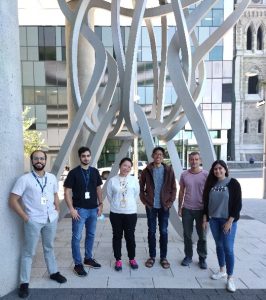8 March 2023
The 14-3-3 protein family comprises a group of scaffold proteins implicated in metabolic processes. Using a Travelling Fellowship from Journal of Cell Science, Samanta Del Veliz visited Gareth Lim’s lab to investigate the role of these proteins in mesenchymal stem cell differentiation.
At the time of her visit to the Lim Lab, Samanta was a PhD student at the Instituto de Histología y Embriología de Mendoza, Argentina, studying how 14-3-3 proteins can affect stem cell differentiation. Mesenchymal stem cells are found in adult tissue and have the potential to differentiate into a range of cell types, including those that constitute the bone, muscle, and adipose tissues. There are a range of 14-3-3 protein family members, and Samanta and her colleagues found that silencing the γ isoform in these stem cells promotes their differentiation into fat cells, in a process known as adipogenesis. She therefore decided to focus her efforts on this isoform.
With funding from one of our Journal of Cell Science Travelling Fellowships, Samanta was able to visit Gareth Lim’s lab at Université de Montréal, Canada. The Lim Lab specialise in 14-3-3 proteins, investigating the role they might play in diseases such as diabetes and obesity. Working with Gareth and the team in Montréal, and with her home lab in Argentina, Samanta found that depleting the 14-3-3γ isoform in mesenchymal stem cells resulted in increased accumulation of lipid droplets within these cells, a characteristic step in adipogenesis. Probing the underlying mechanism, they found that silencing 14-3-3γ in the stem cells also resulted in increased expression of genes involved in adipogenesis, including GLUT-1, a glucose transporter.

Thanks to this collaboration between Samanta’s home and host labs, the project was a great success. “This project was achieved thanks to the ideas of my Argentine supervisor, Diego Bustos, who supported me in obtaining this scholarship and collaborated in the design of experiments together with Gareth Lim,” Samanta explained. “The proteomics work was carried out in Argentina under his direction and allowed us to decipher a possible mechanism underlying the effects we observed.” The Lim Lab were also sure to give her a proper send-off on her last day. “We shared the last meeting, then did an exchange of international foods like Argentinian empanadas and some special doughnuts from Canada,” Samanta said.
Samanta felt well prepared for her visit to the Lim Lab, which she attributed to her training so far. “I found that doctoral students in Argentina have excellent professional preparation, which allows us to interact with other scientists around the world and be part of different research projects,” she explained.
Samanta has now completed her PhD and taken up a postdoctoral position in Lynda Coughlan’s group at the University of Medicine of Maryland, USA. She hopes to publish some of the work that resulted from her Travelling Fellowship experience. “The experience in the Lim Lab was incredible,” Samanta said. “I was able to carry out my experiments faster and with better equipment and technology than those in Argentina. I was also able to improve my ability to speak English because I conducted and participated in seminars with the research group. Overall, I acquired numerous skills and improved my confidence to take on new challenges.”








You must be logged in to post a comment.